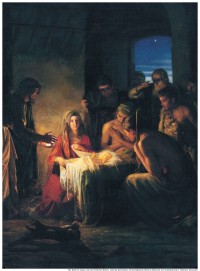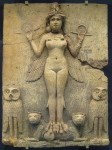 The differences between Christmas and Easter could be told as The Tale of Two Fridays.
The differences between Christmas and Easter could be told as The Tale of Two Fridays.
Black Friday
Every year, Christmas generates over $400 billion of economic activity, with a large percentage of that being spent the day after Thanksgiving, “Black Friday.” Then, for the next four weeks, the frenzied shopping continues, with the hustle and bustle of buying and baking and decorating and cooking, until by the time Christmas gets here, most of us have lost our sanity and our savings.
The Christmas season lasts about four weeks, is kicked off by “Black Friday,” and is characterized shopping, spending, and decorating.

Good Friday
And then there is Easter. Easter week often begins on Palm Sunday, and leads up to “Good Friday” which is the day most people believe Jesus was crucified (I believe it was Thursday, but that’s a different study). Then a few days later, we celebrate Easter, also called Resurrection Sunday, as the day that Jesus rose from the dead. Though Easter week is about the Resurrection of Jesus, the death of Jesus is what makes it all possible.
Generally, very little money is spent for Easter. Very little decorating is done. Maybe a few lilies are bought and eggs are decorated, but other than that, it shares none of the frantic activity that Christmas does.
Which is great. But also odd.

Birth of Jesus vs. Resurrection of Jesus
Did you ever realize that in Scripture, the birth of Jesus doesn’t really matter a whole lot? Oh sure, Matthew talks about it, and Luke gives it some room, but other than those two Gospels, it’s as if nobody cares about the birth of Jesus.
Other than Matthew and Luke, no other biblical author mentions the virgin birth. The star stops shining. The wise men disappear from the stage.
Sure, the details of the birth of Jesus are critical, crucial, important, and necessary, but it still only gets a few short paragraphs in all of the New Testament. (Somewhere, I read the number of verses that talk about the birth of Jesus compared to the number of verses that talk about His resurrection, but I cannot find it right now. Anybody ever run across this?)
The resurrection of Jesus, however, is mentioned in all four Gospels, appears in nearly every chapter of Acts, and finds its way into the center of Paul’s thinking, Peter’s sermons, and John’s writings. It is almost as if the New Testament writers were saying, “The birth of Jesus? Meh … But the resurrection of Jesus? Now that’s the good stuff!”

Re-do the Calendar: Focus on the Resurrection of Jesus
If I could change one thing about the church’s annual calendar, I would do away with the overemphasis on Christmas, and put Easter in it’s proper place of importance. When I was a pastor, I usually preached on Christmas themes during the entire month of December, but only preached about Easter on the one day of Easter.
If I could do it all over again, I might try to follow the emphasis given in Scripture. I would only preach about the birth of Jesus one time per year, or maybe every other year, but preach and teach about the resurrection of Jesus every chance I got, and especially leading up to Easter Sunday.
The problem, however, is that for some reason, most of us don’t get nearly as excited about the resurrection of Jesus as we do for the virgin birth of Jesus.
But I think that when the truth of the resurrection of Jesus gets a hold of our mind, it radically changes, challenges, and inspires us in the same way it did for the early believers.
So forget about Christmas! This week, this month, this year, let’s focus on the resurrection of Jesus!
The cross of Jesus is CENTRAL to everything!
Transform your life and theology by focusing on the crucifixion and resurrection of Jesus:
Fill out the form below to receive several emails from me about the death and resurrection of Jesus.
(Note: If you are a member of RedeemingGod.com, login and then revisit this page to update your membership.)






 Have you ever seen t-shirts that say “God’s Gym” or “Abreadcrumb & Fish”? I’ve seen t-shirts with the Guitar Hero design, but on closer inspection, it says “God is my Hero.” Similarly, there are “Amazing Grace” t-shirts that look like the “American Idol” logo, and I have seen shirts with the superman logo, but with “JC” instead of “S.” I’ve seen a Staple’s “Easy” button with the word “Jesus” on it instead.
Have you ever seen t-shirts that say “God’s Gym” or “Abreadcrumb & Fish”? I’ve seen t-shirts with the Guitar Hero design, but on closer inspection, it says “God is my Hero.” Similarly, there are “Amazing Grace” t-shirts that look like the “American Idol” logo, and I have seen shirts with the superman logo, but with “JC” instead of “S.” I’ve seen a Staple’s “Easy” button with the word “Jesus” on it instead. The simple fact that most people don’t know the origins of the word “Easter” shows that a shift has happened over the past 2000 years. The day has been redeemed. Though Easter is a commercialized holiday, most people still associate it with Jesus and His resurrection from the grave.
The simple fact that most people don’t know the origins of the word “Easter” shows that a shift has happened over the past 2000 years. The day has been redeemed. Though Easter is a commercialized holiday, most people still associate it with Jesus and His resurrection from the grave.